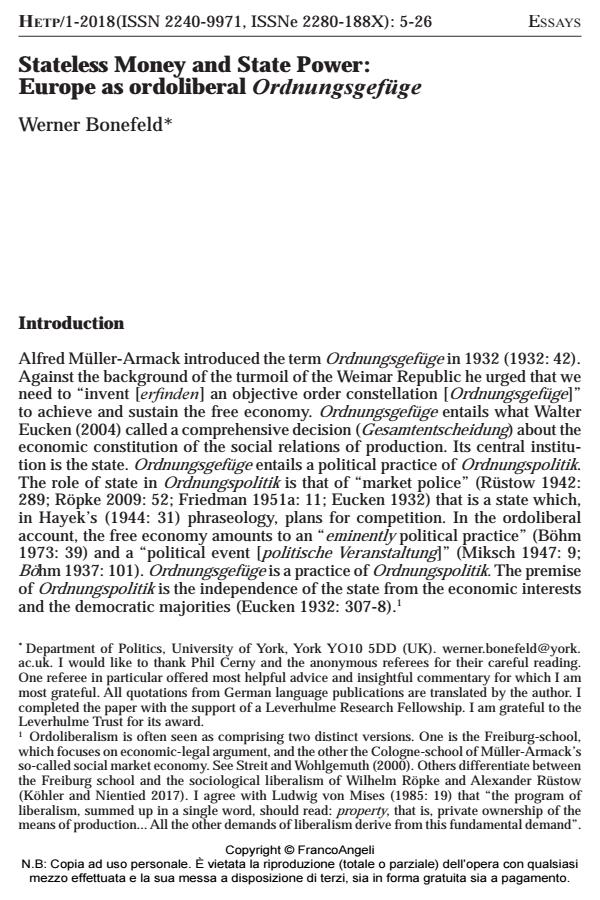Stateless Money and State Power: Europe as ordoliberal Ordnungsgefüge
Titolo Rivista HISTORY OF ECONOMIC THOUGHT AND POLICY
Autori/Curatori Werner Bonefeld
Anno di pubblicazione 2018 Fascicolo 2018/1
Lingua Inglese Numero pagine 22 P. 5-26 Dimensione file 250 KB
DOI 10.3280/SPE2018-001001
Il DOI è il codice a barre della proprietà intellettuale: per saperne di più
clicca qui
Qui sotto puoi vedere in anteprima la prima pagina di questo articolo.
Se questo articolo ti interessa, lo puoi acquistare (e scaricare in formato pdf) seguendo le facili indicazioni per acquistare il download credit. Acquista Download Credits per scaricare questo Articolo in formato PDF

FrancoAngeli è membro della Publishers International Linking Association, Inc (PILA)associazione indipendente e non profit per facilitare (attraverso i servizi tecnologici implementati da CrossRef.org) l’accesso degli studiosi ai contenuti digitali nelle pubblicazioni professionali e scientifiche
Since the start of the Euro crisis there has been an abundance of literature that identifies an ordoliberal Europe with the politics of austerity. This literature is confronted by the paradox that the Euro is a stateless currency. Ordoliberalism holds that economic orders are politically constituted and sustained. The article contends that the exploration of ordoliberal principles of economic constitution and Ordnungspolitik uncovers the crucial role of the member states in monetary union. What monetary union integrates is the role of the state in establishing and sustaining a framework for the domestic conduct of economic activity. In detail, in monetary union the democratically constituted member states assume the role of federated executive states of European money, which governs the decentralised relations of competitive adjustment in territorialised labour markets. The European economic order depends on the commitment and capacity of the member states to make it work within their jurisdictions.
Parole chiave:Ordoliberalism, European Integration, Euro, Executive State, Government
Jel codes:B2, E5, H1, P59
- Zwischen Pflichten und Fiktionen Aaron Sahr, in Zeitschrift für Soziologie /2019 pp.209
DOI: 10.1515/zfsoz-2019-0016 - Ordoliberal ideas on Europe: two paradigms of European economic integration Federico Bruno, in History of European Ideas /2023 pp.737
DOI: 10.1080/01916599.2022.2151494 - New Culture Wars: Tradwives, Bodybuilders and the Neoliberalism of the Far-Right Felix del Campo, in Critical Sociology /2023 pp.689
DOI: 10.1177/08969205221109169 - Greece in the 21st Century Vassilis K. Fouskas, Constantine Dimoulas, pp.1 (ISBN:9781351047524)
- Ordoliberalism, European Monetary Union and State Power Werner Bonefeld, in Critical Sociology /2019 pp.995
DOI: 10.1177/0896920519832994 - Capital Par Excellence: On Money as an obscure thing Werner Bonefeld, in Estudios de Filosofía /2020
DOI: 10.17533/udea.ef.n62a03
Werner Bonefeld, Stateless Money and State Power: Europe as ordoliberal Ordnungsgefüge in "HISTORY OF ECONOMIC THOUGHT AND POLICY" 1/2018, pp 5-26, DOI: 10.3280/SPE2018-001001